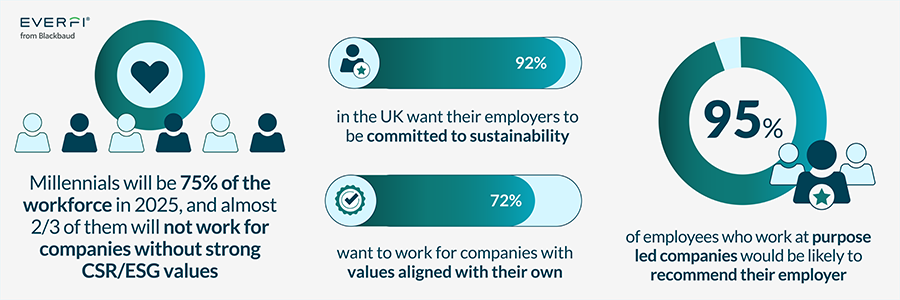Social impact is a talent magnet: leveraging this HR superpower

Hiring new employees is a tough job. Not only is it expensive – with recruitment costing from 15% to 20% of the annual salary for non-executive positions1 -, but it can be difficult to find the right candidate. Although the number of open vacancies is decreasing as the economy recovers, in June this year there were still over 1 million unfilled jobs in the UK2. With just 1.4 unemployed people per vacancy2, finding candidates with the right skills can take months.
The competition for top talent means that retaining employees has also become a significant challenge for organisations, who are facing an average voluntary employee turnover rate of 13%, up from 8% in 20203. So how can you make your company more attractive for job seekers and keep current employees satisfied?
The role of business purpose, ESG and CSR
While the usual culprits – such as compensation and career progression – continue to be important, there are other elements companies can leverage to attract and retain talent. According to a McKinsey study, the meaningfulness of one’s work is the third top factor driving retention of employees, and the lack of it is the top fourth factor driving attrition4. What does it mean to feel one’s work has meaning?

People want to work for purpose-led businesses with values that match their own5, as demonstrated by a young person interviewed by EVERFI: ‘I want to work for people that champion the things that I find important’, says Carla, 22, from Glasgow.
C-suite leaders interviewed by Deloitte already see the value of purpose in attraction and retention of talent, with 79% of them agreeing that it plays an important role for HR6. One of the interviewees was the then-Chief Human Resources Officer at Unilever, Leena Nair (now Global CEO at Chanel), who provided an impressive example about how driving purpose can positively impact your HR processes:
‘People who feel they are living their purpose have 49% more intrinsic motivation and 33% higher job satisfaction. At Unilever, we used every tool for recruiting, promoting, and developing people to drive purpose centrally. As a result, recruitment costs went down by 90%, and attrition is half that of any peer in any market Unilever operates in.’
How to apply this insight
How can your organisation demonstrate its values and purpose? Develop a strategic, meaningful CSR or ESG programme focused on making a positive difference in the community. By developing a CSR or ESG strategy that aligns with business values and delivers measurable and relevant social impact, companies offer their employees a chance to feel their work contributes to a better world. In addition, such programmes are a prime opportunity to involve employees in volunteering, sharing their time, knowledge, and expertise with those in the community who could use it the most.
To learn more about ways in which your business can demonstrate its values and purpose, read on:
Attract & retain talent through CSR
Read The Ultimate Framework for Corporate Social Impact to learn how to create meaningful social impact that shows your business purpose.
Sources:
1 Centric HR. Attraction and Retention.
2 ONS. (Aug 2023). Vacancies and jobs in the UK.
3 PWC. (2022). Employee turnover trends revealed.
4 McKinsey Quarterly. (2022). The Great Attrition is making hiring harder.
5 Barkley & Jefferies. (2022). Purpose Up.
6 Deloitte. (2022).How purpose delivers value in every function and for the enterprise.
Infographic data sources:
Stay Informed
Best practices, the latest research, and insights from our expert network of partners, delivered right to your inbox.
Success!Thank you for signing up. We'll be in touch with more relevant content.







